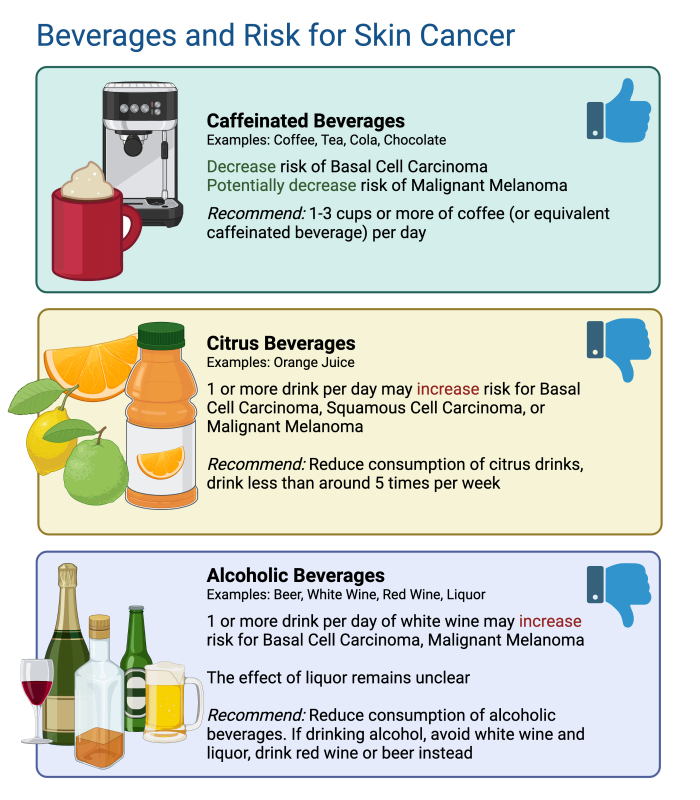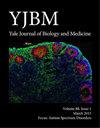咖啡、柑橘和酒精:回顾我们喝什么以及它如何影响我们患皮肤癌的风险。
IF 2.5
3区 工程技术
Q2 BIOLOGY
Yale Journal of Biology and Medicine
Pub Date : 2023-06-30
eCollection Date: 2023-06-01
DOI:10.59249/EVKO3455
引用次数: 1
摘要
气候变化和环境健康与农业和食品供应密切相关。环境影响着可供消费的食品和饮料的可获得性、质量和种类,进而影响着人口健康。一个不断扩大的研究领域是膳食摄入营养素的作用以及它们如何影响患皮肤癌的风险。近年来,我们的研究小组在大型前瞻性队列中研究了膳食营养素,尤其是常见饮料中的营养素,如含有咖啡因、柑橘类产品和酒精的饮料,以评估这些营养素的摄入如何影响皮肤癌的风险。我们的数据表明,摄入柑橘类果汁,如果每天摄入一次或更多,或每周摄入 5 到 6 次,可能会增加罹患角质细胞癌(KC)和恶性黑色素瘤(MM)的风险。在饮酒方面,我们发现白葡萄酒的摄入量可能与 KC 和 MM 风险的增加有关,而啤酒和红葡萄酒则没有显示出这种关联。最后,我们的研究表明,含咖啡因的饮料(包括咖啡、茶和可乐)可能与基底细胞癌(BCC)和多发性硬化症(MM)风险的降低有关。虽然食物摄入量与皮肤癌发病之间的关系很复杂,仍有待于在今后的研究中进一步分析,但我们希望我们的总结可以帮助指导人们做出一些小的改变,从而降低罹患某些皮肤癌的风险。本文章由计算机程序翻译,如有差异,请以英文原文为准。

Coffee, Citrus, and Alcohol: A Review of What We Drink and How it May Affect our Risk for Skin Cancer.
Climate change and environmental health are closely linked with agriculture and food supply. The environment influences accessibility, quality, and variety of foods and drinks that are available for consumption, which in turn influences population health. A growing area of research is the role of dietary intake of nutrients and how they may influence risk for skin cancer. In recent years, our group has studied dietary nutrients, particularly those found in commonly consumed beverages, such as those containing caffeine, citrus products, and alcohol, in large prospective cohorts to evaluate how their intake may influence risk for skin cancer. Our data suggest that intake of citrus juices, when consumed around once per day or more, or around 5 to 6 times per week, may be associated with increased risk for both keratinocyte carcinomas (KC) and malignant melanoma (MM). With regards to alcohol consumption, we have found that intake of white wine may be associated with increased risk for both KC and MM, while beer and red wine have not shown such associations. Lastly, our work suggests caffeinated beverages, including coffee, tea, and cola, may be associated with decreased risk for basal cell carcinoma (BCC) and MM. While the associations between food intake and skin cancer development are complex, and remain to be further analyzed in future studies, we hope that our summary may help guide individuals to small changes they may make towards potentially reducing their risk for certain skin cancers.
求助全文
通过发布文献求助,成功后即可免费获取论文全文。
去求助
来源期刊

Yale Journal of Biology and Medicine
Biochemistry, Genetics and Molecular Biology-General Biochemistry,Genetics and Molecular Biology
CiteScore
5.00
自引率
0.00%
发文量
41
期刊介绍:
The Yale Journal of Biology and Medicine (YJBM) is a graduate and medical student-run, peer-reviewed, open-access journal dedicated to the publication of original research articles, scientific reviews, articles on medical history, personal perspectives on medicine, policy analyses, case reports, and symposia related to biomedical matters. YJBM is published quarterly and aims to publish articles of interest to both physicians and scientists. YJBM is and has been an internationally distributed journal with a long history of landmark articles. Our contributors feature a notable list of philosophers, statesmen, scientists, and physicians, including Ernst Cassirer, Harvey Cushing, Rene Dubos, Edward Kennedy, Donald Seldin, and Jack Strominger. Our Editorial Board consists of students and faculty members from Yale School of Medicine and Yale University Graduate School of Arts & Sciences. All manuscripts submitted to YJBM are first evaluated on the basis of scientific quality, originality, appropriateness, contribution to the field, and style. Suitable manuscripts are then subject to rigorous, fair, and rapid peer review.
 求助内容:
求助内容: 应助结果提醒方式:
应助结果提醒方式:


